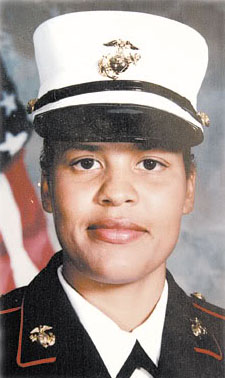
The First to Die
By Wayne A. Young
Wednesday, January 9, 2002, a U.S. military KC-130 plane crashed into a mountain in Pakistan. The fiery crash took the lives of seven marines. One of those marines was Sargent Jeannette Lee Winters.
When the flying vessel exploded, Winters became the first woman in the Marines’ 226-year history and the first American woman ever to leave this world fighting in the U.S. War on Terrorism. “She was a very active, daddy’s girl,” recalled her father, Matthew Winters, Sr., in an exclusive interview during the last July 4 weekend.
As I drove down one of Gary, Indiana’s main streets looking for a landmark leading to Winter’s home, I heard fireworks exploding in celebration, or at least observance, of American Independence Day. At the landmark, I made a right onto a gravel-covered road. I rolled slowly as the road winded into the woods and ended at a very modest beige-aluminum sided house and a very proud father.
“I’m proud that her name is in the history books, that she died for her country, and to have been her father,” said the Greenville, Mississippi native. The elder Winters left the South and arrived in the Steel City with his father in 1946 when he was only 11-years-old. He tried to make a living playing the guitar, but to support his family of four boys and two girls, he found himself behind the wheel of a truck.
When Nen, BayBay or Jay (the names that Jeanette’s family would often call her) was young, she wanted to be an entertainer like her father. “Every time I would take my guitar out, she would take the microphone and start singing,” her father recalled. She eventually learned to play the piano.
She entered college with an eye on becoming a doctor. After two years at Indiana University - Bloomington, she followed one of her brother’s footsteps into the Marines. Her father remembers asking her about her choice. “Yes, that is what I want to do,” he recalls her saying.
Winters joined the Marines in 1997 and became a radio operator. In December 2001, The United States stationed her in Pakistan.
“It’s a tough, dangerous business over there,” commented Defense Secretary Donald Rumsfield after her death. Jeanette’s father agrees with Rumsfield and remains happy with his daughter’s decision to join the military. Her joining, “made me happy, cause she was happy,” says the elder Winters who would have willingly served his country in Vietnam if he had past the entry test.
However, his contentment is not without pain. “The hurt is still there because she was my daughter,” he continued. He also says it’s time to stop the war and “bring the children home.”
With Jeanette’s body back in her hometown, the military paid for her funeral, the city of Gary handled the cost of funeral food, Tyson Ford (a Black-owned dealership) lent a car to her brother that was on leave from the Marines, and Trump Hotel – Gary provided her grieving relatives free room at its lakeside inn. However, not everyone is her hometown was mourning. During funeral services, thieves broke into her father’s home. The police eventually caught the thieves that the elder Winters did not know.
Winters attended their trial. The thieves never apologized. “They should have been sensitive to her sacrifices,” said the avid fisher as he introduced me to his son Chris. The 30-year-old truck driver didn’t have much to say, but the likeness of his sister tattooed on his right arm spoke volumes.
On January 26, the family laid Winters’ remains to rest in Calumet Cemetery in nearby Merrillville. They buried her next to the remains of Janet, the woman whose body served as the vessel that peacefully brought her into this world.
|